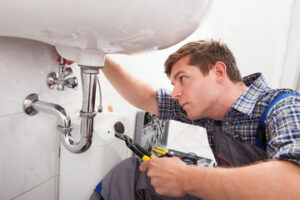Security guards put themselves at risk each and every day. They patrol, observe and enforce rules at malls, community colleges and large events. They also act as a visible deterrent to criminals and others who may want to damage property or illegally enter a private area.
They also serve as first responders in case of medical or other emergencies. Consequently, they need to have adequate training and knowledge on the following topics. Click the DMAC Security to know more.

Security guards monitor their assigned areas and work to deter and prevent security breaches, like theft, vandalism or unauthorized access. They do this by patrolling the premises, monitoring surveillance systems, and responding to alarms or disturbances. They also perform customer service tasks, such as screening and assisting people entering and exiting buildings or events.
They can also identify suspicious activity by noticing unusual smells or sounds and following up on them. For example, if a security guard sees someone with an unusual backpack, they can follow them to find out who it is. They can also detect fires or other emergency situations, and are trained to respond immediately with first aid until they can call for help.
Being a visible presence can be an effective deterrent, and security guards are often stationed at building entrances, ensuring they can offer assistance to anyone who enters the property. They must balance this duty with their other tasks, demonstrating strong communication skills and decisive leadership until responders arrive.
In crowded settings, security guards may also help maintain order by enforcing rules and regulations. For example, they can ensure that people don’t crowd into elevators or stairways, and that they lock their computers when leaving their desks. They can also help prevent information theft by requiring visitors to sign in and out, and they can check IDs for security reasons.
Security guards can also collaborate with law enforcement on investigations into incidents that occur on their premises. This requires knowledge of laws and regulations about privacy, security and trespassing. They also participate in training and drills to stay up-to-date on their skills and prepare for any scenario that may arise while on duty.
Surveillance
The ability to keep an eye on things is essential for security guards. Surveillance involves the constant, covert observation of people and places. Depending on the type of surveillance used, it can be done by cameras or physical tracking. It is also possible to combine physical surveillance with a face recognition system that can automatically identify and direct police to fugitives. Surveillance may be performed with a nondescript vehicle or on foot, and is usually done in a coordinated activity called a stakeout (the name derives from the practice of land surveyors who place survey stakes around the area to mark off a plot for construction).
The effectiveness of surveillance depends on its ability to provide top management with focused, reliable, timely evidence that is analyzed effectively and presented to them in time for action. This requires knowledgeable technical personnel who are able to identify and present information to managers that is most relevant to their intervention needs. This may involve presenting simple tables and graphs or using more sophisticated data analysis techniques. The type of surveillance also matters; those who support video surveillance in city streets may not support indiscriminate telephone taps, for example.
Detection of Irregular Activity
Security guards are often the first to notice any problems that may arise on premises. Whether it’s a fire, medical emergency, or criminal act, the security guard is often the first to respond and handle the situation until first responders arrive. This requires excellent communication skills as well as decisive leadership.
Security officers also ensure that preventative measures are being followed. They regularly perform safety checks to confirm that alarm systems, fire equipment, and other safety mechanisms are functioning properly. They also monitor any activity that could be deemed suspicious or out of the ordinary and report any findings to their superiors.
A good security guard is a highly visible presence in public areas, a deterrent to anyone who may be planning illegal activities on the premises. They are trained in conflict resolution techniques, allowing them to diffuse potentially volatile situations and keep them from escalating until police arrive.
In some cases, security guards are tasked with providing customer service. For example, when stationed at building entrances, security guards might be expected to welcome guests, offering information and directions. This is a very important part of their role as it contributes to a positive experience for visitors.
Security guards must be familiar with all the procedures of their employer’s establishment. They must have the ability to recognize all the people who come into their area of responsibility, detect any unauthorized individuals, and observe all situations. They must be able to determine details regarding an incident and communicate them clearly to other security personnel like EMTs or firemen. They must also know how to sound the alarm and call the proper authorities if necessary. This will help to prevent panic amongst the people and keep everyone safe during a crisis event.
Reporting
Security guards are responsible for monitoring their assigned areas, documenting any unusual or suspicious activity and reporting it to a higher authority. They may also be expected to patrol the premises, and provide customer service for visitors, customers or residents. Some security guards work outdoors, where they must be prepared to handle various weather conditions and travel from one area of a property to another.
The most common setting for a security guard is within a business environment. In this setting, a guard is often the first person to detect and deter crime, and will be stationed at the entrance of a building or facility, monitoring access control and enforcing rules like no smoking and loitering. They might be called upon to conduct internal investigations into disturbances, respond to alarms triggered by intruders or fire alarms; write reports; patrol the grounds; detain suspects until law enforcement arrives; and operate surveillance equipment such as CCTV cameras.
Many professional security guards are armed, which adds a level of physical protection to their role and can make them more effective deterrents to criminal activity. Armed security professionals receive a greater amount of training than their unarmed counterparts, including a weapons training program, active shooter training and psychological examinations. They are also regulated by the state in which they work, and are required to comply with the laws of that jurisdiction.
Other professionals in this field are not armed, and they focus less on deterring crime and more on patrolling the premises to observe activity. These guards are often more visible than their armed counterparts, and are stationed at key checkpoints around the property. They may also be required to train guards under their command.
Communication
Security guards work in a variety of settings and must communicate effectively in all situations. This can include interacting with guests, providing directions and offering assistance when requested. They can also have to write reports and document incidents that occur during their shifts. This requires clear recollection of events so that paramedics and responding officers can act quickly to de-escalate a situation, secure the area, redirect foot traffic or help people find their way out safely.
Security personnel often patrol premises to detect any signs of theft, damage or unauthorized entry and report suspicious activity to the proper authorities. They may also perform access control at building entrances and vehicle gates, meaning they must be able to verify that employees and visitors are authorized to enter. Other duties include responding to alarms; investigating disturbances and writing reports; apprehending suspects; conducting searches; enforcing rules and regulations and operating surveillance equipment such as CCTV cameras.
In addition to their patrolling and observing for signs of crime, many security guards are called upon to assist with serious emergencies such as medical problems or fires. They must be able to communicate with those who are experiencing these situations and summon emergency responders as needed. This is why clear communication, professionalism and physical fitness are essential to a career in the field of security.
For those who enjoy working in a customer-facing role, there are many options to choose from, including a job at a shopping mall where you can build a good rapport with regular patrons. Many officers who work in these types of positions report that it is one of the most rewarding aspects of their careers.
Other security guards may choose to focus on a specific location or a private event, where they can be stationed in the same spot throughout an entire event. This type of work may be better suited to those who prefer to have a consistent schedule and the ability to focus on a certain type of environment. Either way, there is a role for every personality in the field of security.
